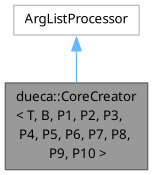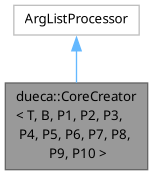A start-up mechanism for declaring new objects available to the scripting language(s) used in DUECA (currently Scheme and Python). More...
#include <CoreCreator.hxx>


Public Member Functions | |
| CoreCreator (const ParameterTable *table, const char *name=NULL, voidfunc extra=NULL) | |
| Constructor, with class name as argument. | |
| CoreCreator (const char *name, voidfunc extra) | |
| Constructor, for a virtual base class. | |
| CoreCreator (const ParameterTable *table, ArgListProcessor::Strategy strategy, voidfunc extra, const char *name) | |
| Constructor. | |
| ~CoreCreator () | |
| Destructor. | |
| const char * | callName () const |
| Print name of the make call. | |
Static Public Member Functions | |
| static void | ifunct () |
| Function called when actual script work can be done. | |
| static void | ifunct0 () |
| Function called when actual script work can be done, no args. | |
Detailed Description
class dueca::CoreCreator< T, B, P1, P2, P3, P4, P5, P6, P7, P8, P9, P10 >
A start-up mechanism for declaring new objects available to the scripting language(s) used in DUECA (currently Scheme and Python).
If you want to add a new class (not a Module, normally a "helper" class) to the scripting language, that class needs the following properties:
- The class is derived, directly or indirectly (but once and only once!) from the ScriptCreatable class.
- The class has a constructor with up to 10 arguments.
- The class optionally has a complete() function, which returns true after checking that all the class parameters and settings are correct. When this function returns false, the script fails.
- The class optionally has a parameter table (best is to write a static member function getParameterTable() that returns this table) that defines which methods may be called from the script, or which member variables may be altered.
- The class optionally has MemberCall or MemberCall2Way compatible member functions that accept the parameters defined in the scheme script. These functions can be supplied in the ParameterTable.
In an object file, normally the file with the implementation of the class, create one (and only one) CoreCreator object:
If your class derives from another class than directly from ScriptCreatable, specify that class as the parent in the second template parameter.
You will also see instances without the object name given. These are compatible with older code, which uses the macros SCM_FEATURES_NOIMPINH and SCM_FEATURES_IMPINH to indicate the class inheritance structure and script-side names.
If your object does not directly derive from ScriptCreatable, indicate the parent:
The Python scripting interface needs the name for the parent. Add the following to your code:
If the constructor takes arguments, add the classes of the arguments, here is an example with three arguments:
In this case, always 3 arguments have to be supplied. Python interfaces can be configured with default arguments, this example makes the last 2 arguments optional:
Use the ParameterTable of your class to provide help text for all parameters in the table (note these are different from your constructor parameters again), and overall help text for the object.
Template parameters; note that the last template parameter can be replaced by a bpy::optional with another set of template parameters, but only for Python scripting, not for Scheme.
- Template Parameters
-
T Class to create B Parent class, default ScriptCreatable P1 First argument parameter P2 Second argument parameter P3 Third argument parameter P4 Fourth argument parameter P5 Fifth argument parameter P6 Sixth argument parameter P7 Seventh argument parameter P8 Eighth argument parameter P9 Ninth argument parameter P10 Tenth argument parameter
Constructor & Destructor Documentation
◆ CoreCreator() [1/3]
| dueca::CoreCreator< T, B, P1, P2, P3, P4, P5, P6, P7, P8, P9, P10 >::CoreCreator | ( | const ParameterTable * | table, |
| const char * | name = NULL, | ||
| voidfunc | extra = NULL ) |
Constructor, with class name as argument.
This constructor is primarily targeted for the new Python interface, script class name and parameters are supplied. Compatibility with older Scheme interface (where class name is extracted from class template parameter) is maintained.
- Parameters
-
table Pointer to the parameter table. May be NULL, in this case there are no parameters to be given in the module creation. name Name for the class as it will be known in the script extra Additional function to be called if table creation is not flexible enough (e.g. for creating additional calls/interfaces).
◆ CoreCreator() [2/3]
| dueca::CoreCreator< T, B, P1, P2, P3, P4, P5, P6, P7, P8, P9, P10 >::CoreCreator | ( | const char * | name, |
| voidfunc | extra ) |
Constructor, for a virtual base class.
This constructor is primarily targeted for the new Python interface, script class name and parameters are supplied. Compatibility with older Scheme interface (where class name is extracted from class template parameter) is maintained.
- Parameters
-
name Name for the class as it will be known in the script extra Additional function to be called if table creation is not flexible enough (e.g. for creating additional calls/interfaces).
◆ CoreCreator() [3/3]
| dueca::CoreCreator< T, B, P1, P2, P3, P4, P5, P6, P7, P8, P9, P10 >::CoreCreator | ( | const ParameterTable * | table, |
| ArgListProcessor::Strategy | strategy, | ||
| voidfunc | extra, | ||
| const char * | name ) |
Constructor.
With the template parameter and a pointer to the table, this enables access to module creation from Scheme.
- Parameters
-
table Pointer to the parameter table. May be NULL, in this case there are no parameters to be given in the module creation. strategy Interpretation of the table. Determines whether old-style lists are also allowed. extra Additional function to be called if table creation is not flexible enough (e.g. for creating additional calls). name Name for the class, automatically derived for scheme
The documentation for this class was generated from the following file:
- /home/abuild/rpmbuild/BUILD/dueca-4.2.5-build/dueca-4.2.5/dueca/CoreCreator.hxx